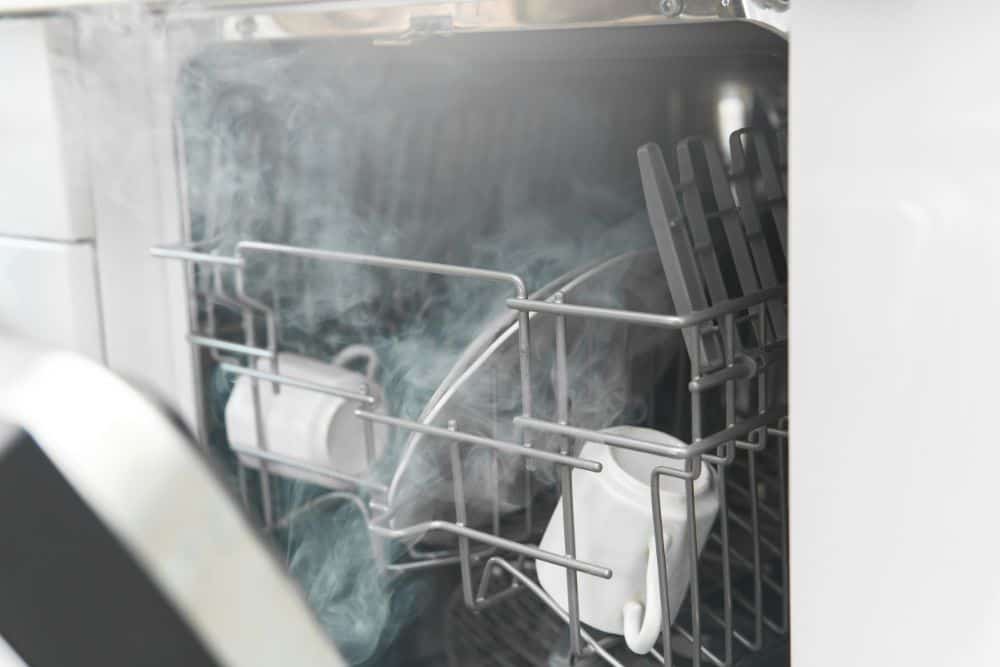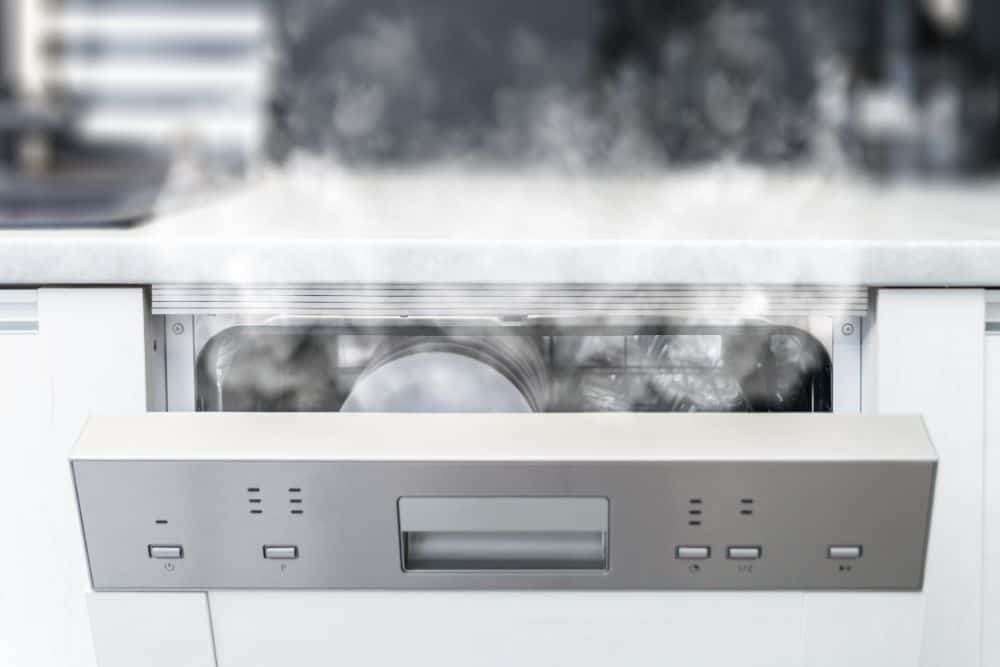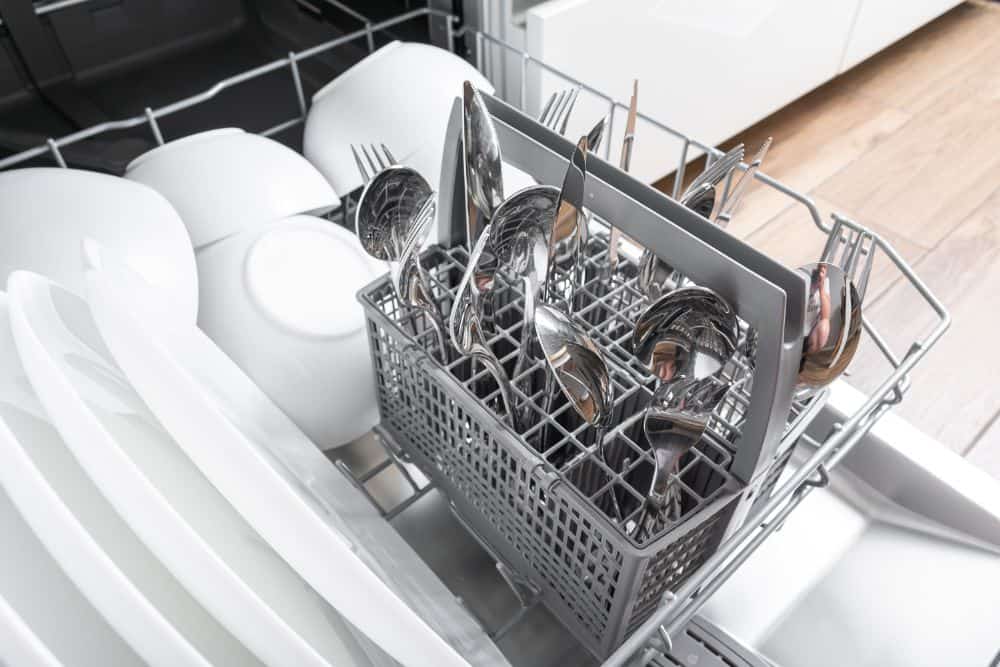Slaving over the sink in the aftermath of a fantastic meal is the worst part of cooking. And dishwashers have become a saving grace for many home cooks that don’t want to spend their after-dinner time washing dish after dish.
Most people are familiar with the burst of hot steam that emulates from the dishwasher when they open it after a cycle. But how do dishwashers heat water? How does a dishwasher even work? You can find out here!

There are two main ways that dishwashers get hot water to wash your dishes. Generally, people don’t think about how dishwashers heat water, but if you’re installing a new dishwasher or having trouble with yours, knowing how it functions can be helpful.
The first-way dishwashers heat water is using their own heating element. In these dishwashers, cold water fills the basin at the bottom of the dishwasher, and then the heating element heats the water to at least 120 degrees Fahrenheit and as high as 150 degrees.
The dishwasher has an internal thermostat that recognizes when the water reaches the correct temperature and begins the washing cycle. Most modern dishwashers, like Bosch dishwashers, operate this way rather than having hot water hookups, as discussed below.
Rather than using the hot water line in your home, the dishwasher’s heating element uses electricity to function. So rather than pulling from your hot water supply, it costs electricity to run.
A hot water hookup means the dishwasher pulls hot water directly from your hot water supply. However, these dishwashers still typically have their own heating element in case the water temperature is not high enough to sanitize the dishes.
But if your water heater is not functioning properly and doesn’t heat the water to a minimum of 120 degrees, the cleanliness of your dishes will likely suffer. The heating element in dishwashers that rely on hot water tanks usually only have the power to raise the temperature 20-30 degrees higher to optimize the rinse cycle.
A good practice for using dishwashers with a hot water hookup is to run your kitchen tap until the water feels hot, not warm water, but hot. Once you feel hot water, you should start your dishwasher.
Sometimes a water heater is low on hot water if it serves a whole apartment building, so you may want to wait until you feel hot water to start your dishwasher if it doesn’t get hotter than warm.
These dishwashers use less electricity but pull from your hot water supply, so the two types of dishwashers will affect your utility bills differently.
Dishwashers are a modern blessing, saving you from doing the tedious work of washing dishes over and over again by hand. Here’s a look at how most dishwashers do their job.
And voila! All your dishes are squeaky clean and ready to be used or put away!
Experts recommend opening your dishwasher once the cycle finishes allowing the dishes to air dry for about twenty minutes before putting them away.
Putting away wet dishes can lead to mold, bacteria, and funky smells. And airdrying is the safest way to dry anything and reduce its exposure to bacteria.
You may wash a dish in cool water and think it looks clean. But you should always use hot water to wash dishes. Once again, use hot water, not warm water, to effectively wash your dishes.

So if something is funky with your water heater and your dishwasher pulls from your hot water line, you should wait to run a cycle because it won’t clean the dishes properly.
Below are four reasons why you should always wash your dishes in hot water and why it's so important that your dishwasher work maintain a hot water temperature.
The first and most important reason to use hot water is to sanitize your dishes, killing bacteria and microorganisms. Even if you scrub with all your might using cold water, bacteria and microorganisms can still reside on your dishes, posing a potential health risk. And killing bacteria is the entire point behind washing dishes!
Hot water is far more effective at removing food remnants from plates. Cold water makes it more difficult to scrub away stuck-on food and substances. Hot water will do a great deal of the work for you when washing dishes. If you run a dishwasher full of super dirty dishes with cold water, everything will likely still be dirty when you open the dishwasher. In general, washing with hot water makes everyone’s life easier.
Grease is an inevitable part of cooking. But cleaning grease can be a massive headache. If you try to clean a super greasy dish in cold water, you’ll notice that the water sits on top of and slide off the grease build-up. But hot water can cut through grease, helping to separate it from your dishes.

Hot water evaporates. So when you wash your dishes, whether by hand or in the dishwasher, using hot water, they will dry faster. Hot water evaporates faster than warm water. Plus, when hot water dries off your dishes, it won’t leave spots or streaks the way cool or lukewarm water does. So your dishes will look and feel cleaner.
Below are commonly asked questions about dishwashers and other home appliances that use hot water.
Yes, all modern dishwashers use hot water to clean dishes. Some dishwashers are hooked up to cold water and some have a hot water connection. Regardless of whether the hookup is hot or cold water, the dishwasher must use a heating element to get the water hot. High temps are required to effectively dissolve the dishwasher detergent to sanitize and effectively clean your dishes during a wash cycle. However, some have the option to run cold cycles. A cold cycle is typically only for gently cleaning dusty dishes or delicate items, as the cold water doesn’t kill bacteria.
The very first mechanical dishwashing machine was invented and patented in 1850. The first electric-powered dishwasher came about in 1929.
The first dishwashers used anywhere between nine and fourteen gallons per dishwasher cycle. But they’ve become much more efficient in recent years, and a modern dishwasher may use as little as three to four gallons per cycle.
Most washing machines only access your cold water supply. So all modern washing machines have their own element to heat the water.
